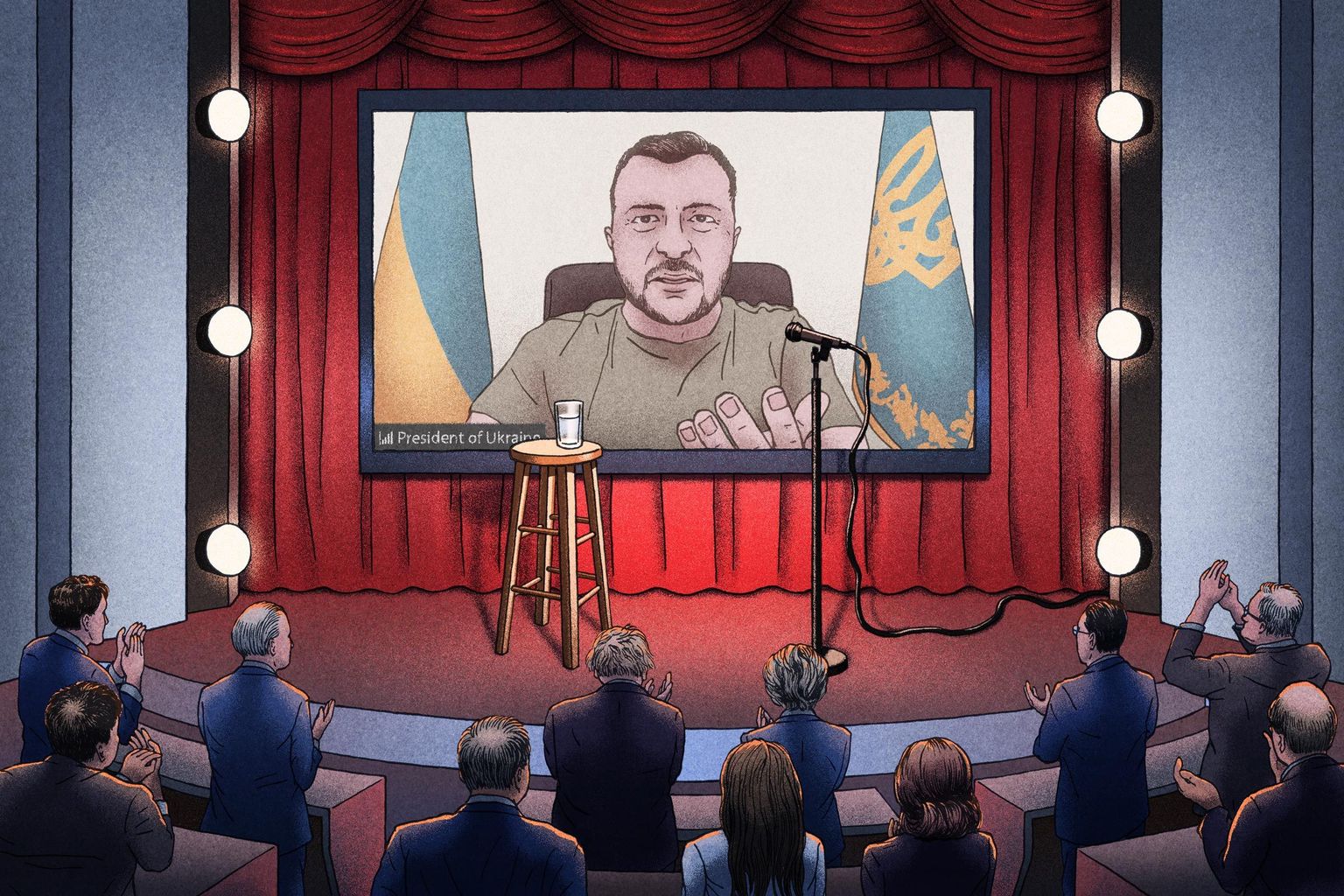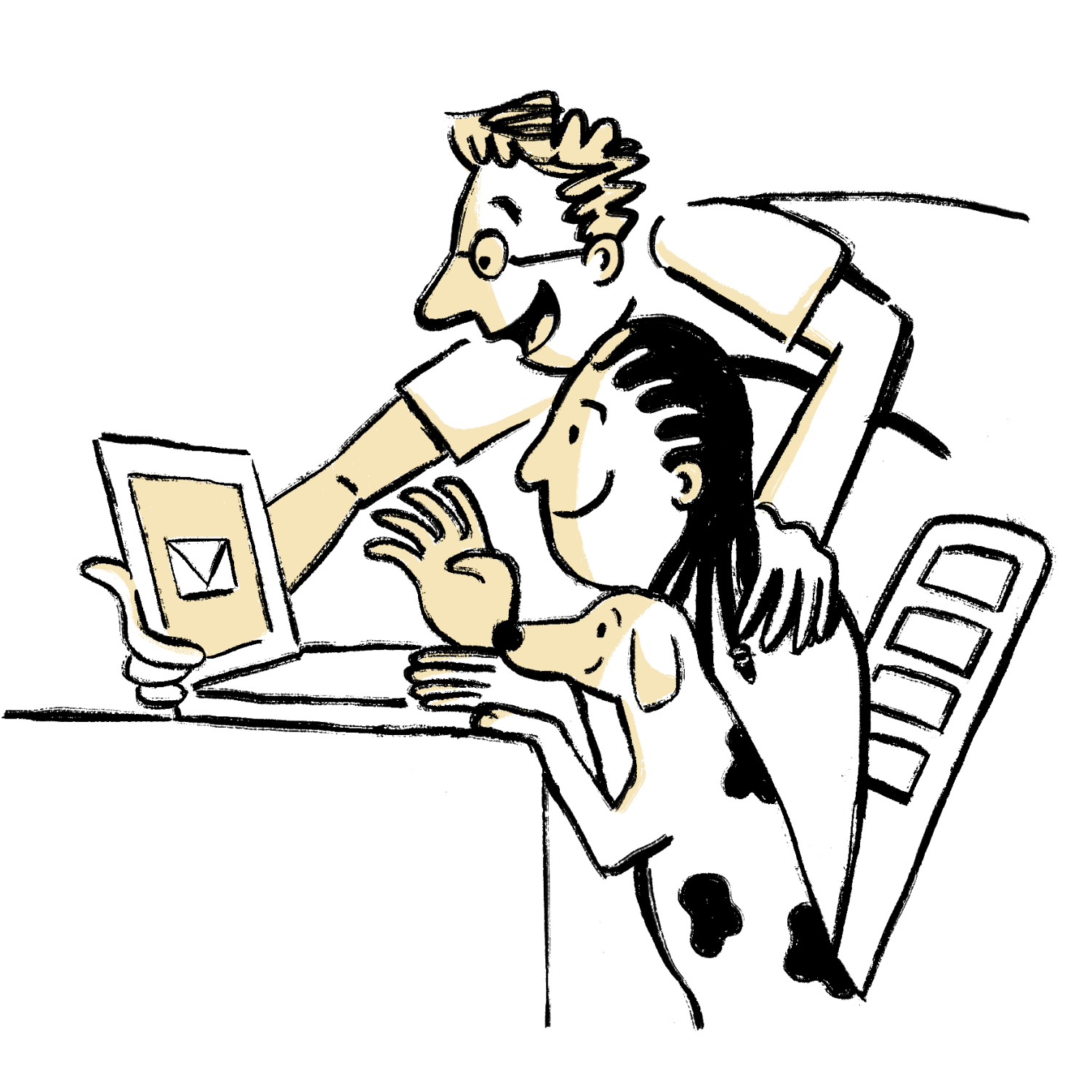“Is this thing working?”: How Zelensky borrowed from comedy to capture the world’s attention
Before he was president of a country under siege, Volodymyr Zelensky was a comedian. Now, as he seeks to save Ukraine from Russia, Zelensky is transferring the skills he learned on the comedy circuit to the diplomatic stage.

Illustration by Xinmei Liu
Politics and entertainment are ruinous temptations to the practitioners of both. Entertainers yearning to be taken seriously believe that their charm and charisma qualifies them for high office; they often discover, upon reaching it, that governing is difficult, complicated and tedious, that they suck at it, and that the applause to which they had grown accustomed has dwindled to the sort of seething silence that often precedes the first empty bottle arcing stageward from the stalls. Politicians wanting to be liked go on panel shows and talent quests and tend to find that none of this stuff is as easy as the professionals make it look, and furthermore, that everyone resents you clowning around on television instead of getting their bins collected.
Before February, Ukraine’s president, Volodymyr Zelensky, appeared yet another cautionary example of the perils of both the aspiring leader and the voter assuming that celebrity and authority are the same thing. From 2015 to 2019, Zelensky had played an unlikely outsider president in a droll satirical sitcom, Servant Of The People. In 2019, Zelensky ran for president for real. Ukrainians bought into the joke and elected him. By February, the gag was wearing thin. Zelensky’s approval rating was circa 25 per cent and falling: if his presidency was still a TV show, it would have been cancelled.
On February 24, Russia invaded Ukraine—or, more accurately, invaded even more of Ukraine than it had in 2014. Among the many miscalculations made by Vladimir Putin, one concerning the mettle of his Ukrainian counterpart stands out. Putin might well have picked Zelensky for a dilettantish poseur likely to bolt for the first available helicopter. But when the United States apparently made such an offer, Zelensky responded with what will surely one day form the chorus of a patriotic accordion ballad of not fewer than 27 verses: “I need ammunition, not a ride”. It was an early indication that, in these peculiar circumstances, Zelensky’s peculiar background might become a peculiar advantage: his statement of defiance had the quality of the instant zinger with which an experienced showman might silence a heckler.
This itself should not be surprising. Volodymyr Zelensky has been, in his time, a touring comedian, albeit mostly as part of a troupe rather than as a solo stand-up. He will be familiar nevertheless with a stock fallback of a performer seeking to ingratiate him or herself with a new audience: find out something about wherever the hell it is you are playing tonight—a local landmark, a local news story, a local rivalry with the town you played last night—and do some sort of riff on it.
As president of a country fighting an existential war, Zelensky is necessarily confined—aside from the risks to his own safety, his leaving Ukraine would have perilous consequences for national morale. But he has been on the road, after a fashion. Seeking to rally allies, and keep Ukraine’s struggle in the headlines, Zelensky has conducted a virtual world tour of some extremely exclusive venues: the Congress of the United States, the House of Commons of the United Kingdom, the General Assembly of the United Nations, the European parliament, a NATO summit, the parliaments of Australia, Japan, Ireland, Canada, Germany, France, Poland, Greece, Spain and Latvia—among others—and a smattering of universities.
It is no disrespect to the seriousness of Zelensky’s message to observe that he has set about these appearances much like a professional entertainer undertaking a protracted treading of out-of-town boards. He has dressed for the part he is playing, usually wearing a simple khaki t-shirt adorned with the cossack cross of Ukraine’s army, and grown a careworn beard (this had hilarious consequences when France’s president, Emmanuel Macron, clearly envious of Zelensky’s gravitas if not his situation, posed for a much-mocked photo session sporting raffish stubble and a charcoal hoodie bearing the logo of France’s 10th Air Parachute Commando).
And crucially, Zelensky has tailored his monologue adroitly for every room. His equivalents of “How about that local sports team?” or “What’s wrong with those yokels down the road?” have been deft—if rarely subtle—appeals to the vanities and the fears of each audience.
When he spoke to Spain’s Congress of Deputies, Zelensky invoked Guernica—the Basque city bombed during Spain’s Civil War by the air forces of Nazi Germany and fascist Italy, allies of General Francisco Franco’s Nationalist faction. Zelensky compared Guernica to Mariupol, to suggest—not unreasonably—that here was another city destroyed by an aggressor that the world had failed to take sufficiently seriously. “April 2022,” he said, “and it’s as if it’s April 1937.” Zelensky understood how solidly this would land with Spain’s current government, led by the Socialist Workers’ Party—still rightly proud of the role it once played in trying to defend Spanish democracy from Francoist fascism.
In the UK, Zelensky again demonstrated that he knew his crowd. Beaming into a House of Commons dominated by a Brexiter Tory government elected on a platform substantially assembled from World War II movies and fronted by a bumptious Winston Churchill tribute act, Zelensky said, “We will fight in the forests, in the fields, on the shores, in the streets.” To reach back beyond the cheap seats, he threw in a Shakespearean allusion: “The question for us now is to be or not to be… it’s definitely yes, to be.”
To the US Congress, Zelensky invoked Pearl Harbour and September 11, nodded to Martin Luther King Jr. (“I have a dream… these words are known to each of you today”) and alluded to the most celebrated section of the Declaration of Independence: “our right to live freely in our own country choosing our own future” is an obvious echo of “life, liberty and the pursuit of happiness”. To France’s parliament, he shifted the Mariupol comparison from Guernica 1937 to Verdun 1916, and spoke of “freedom, equality, brotherhood,” which was to say—literally—“Liberté, égalité, fraternité,” France’s national motto.
Australia was a tricky one. It has little obviously in common with Ukraine, as Zelensky implicitly acknowledged by repeatedly emphasising the immense geographical distance between the two countries. But he led off nevertheless with a local connection—the 2016 landing in Perth of the mighty Ukrainian An-225 cargo plane Mriya, since destroyed in its hangar by Russian shelling. And there was a skilful summoning of Australian paranoia. “No state on the planet,” he said, “should have even a theoretical possibility to block maritime trade routes.” In the unlikely event that Zelensky is ever invited to address the Central Committee of the Communist Party of China, it’ll be interesting to see if he takes a swipe at those querulous, paranoid yahoos in Canberra.
I was recently in the audience for one of Zelensky’s monologues, at least to the extent that standing in front of one screen makes one more a part of the audience than sitting in front of any of the others on which people around the world might have been watching it. But I was part of the live crowd which Zelensky was specifically addressing—those gathered for 2022’s Globsec Security Forum in Bratislava.
There seemed an obvious enough local angle for Zelensky to light upon. Slovakia is a neighbour of Ukraine’s, and has experience well within living memory of being invaded by Russia—or, as it was in 1968, the Soviet Union. But he took a more oblique approach, invoking the Danube river, on the north bank of which Globsec is held, as a metaphor for Europe’s linked destiny. When he listed some of the cities through which it flows—Vienna, Budapest, Linz, Regensburg, Belgrade, Izmail—it was akin to a comic, lonely in the spotlight, hoping for an answering cheer from someone in the crowd recognising the name of their hometown.
There is nothing wrong with this. If you want people to listen to you, whether you’re asking for laughs for your whimsical observations about what the deal is with airline food or pleading for weapons to defend your country, you need to get them onside. Zelensky understands in both contexts the power of the local reference—and of the catchphrase, in his case the signoff “Slava Ukraini!” (“Glory To Ukraine!”).
He’s here all week.
